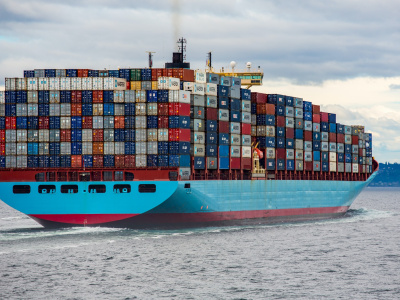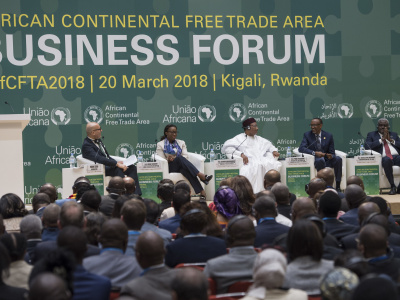
Practitioner perceptions on linkages between trade & non-trade issues
The EU may need to reconsider the use of trade agreements for promoting non-trade policy objectives. Many experts and stakeholders surveyed deem trade agreements to have limited utility in that regard. Instead, a stronger emphasis on support for non-governmental organisations, expert dialogues and targeted technical and development assistance seems warranted.
Countries frequently use trade policy to pursue broader public policy objectives. The US-China trade war is a case in point. Here, trade policy was transformed from a technocratic domain to an instrument in the geopolitical struggle for global leadership. In the current COVID-19 pandemic, some countries have used trade policy to maximise domestic access to medical supplies and drugs. This is another manifestation of linkages between trade policy and broader public policy objectives.
The European Union (EU) is an especially avid user of such linkage strategies, owing to its unique legal and political nature as an actor in global affairs. The EU uses trade policy to advance so-called non-trade policy objectives (NTPOs) in partner countries. Examples of NTPOs are human rights, labour standards and environmental protection. To attain NTPOs, the EU conditions third country access to the EU market and other trade privileges on cooperation in key non-trade policy domains.
Fit for purpose?
EU trade policy is increasingly embedded in the EU’s broader public and foreign policy strategy. Yet, this has raised questions about policy linkages. Who supports linkages between trade policy and NTPOs in the EU? How effective are these linkages for attaining NTPOs in the eyes of stakeholders? Do these policy linkages undercut trade policy objectives? Finally, how could the EU improve its use of policy linkages for better outcomes?
An expert survey undertaken as part of the Horizon 2020 research project ‘Realising Europe’s Soft Power in External Cooperation and Trade’ (RESPECT) sheds light on these questions. Respondents comprised representatives of European institutions, member state governments, businesses, civil society organisations and third country governments. The key findings are presented in a forthcoming article in the Journal of Common Market Studies.
Support for linkages
Overall, most survey respondents welcomed linkages between trade policy and NTPOs. Respondents from the European institutions, member state governments and civil society organisations were particularly supportive of policy linkages. Representatives of businesses and third country governments were less enthusiastic. Interestingly, respondents from large firms were more supportive of policy linkages than respondents from small and medium-sized firms. Large firms may be less troubled by policy linkages because they have greater resources to cover any additional costs they may bring.
When it comes to the perceived effectiveness of policy linkages in promoting NTPOs, officials from the European institutions and member state governments were more aligned with business representatives. Overall, they considered policy linkages to be effective in promoting NTPOs. However, they also felt this came at the expense of trade policy objectives. Respondents from civil society organisations considered policy linkages less effective for promoting NTPOs, and were also less convinced that policy linkages had negative implications for attainment of trade policy objectives.
What instruments are best?
Respondents were asked their views on the effectiveness of various instruments for achieving NTPOs, including trade agreements, technical cooperation, development assistance, dialogue, support for non-governmental organisations (NGOs) and foreign direct investment (see table). Respondents in all categories considered targeted support for NGOs and expert dialogue between the EU and partner countries to perform best. Preferential trade agreements – with built-in conditionalities – were largely seen as less effective and desirable for attaining NTPOs. Officials from the European institutions were outliers here, as they considered preferential trade agreements to be an effective instrument to pursue NTPOs.
The survey findings come at a relevant time for EU policymakers, as the European Commission is presently conducting an internal review of its trade policy. Judging from comments made by Trade Commissioner Phil Hogan at his European Parliament hearing in September 2019, the Commission seems poised for a stronger focus on NTPOs and ensuring policy coherence in external relations.
Our findings suggest that the EU may need to reconsider its strong commitment to trade agreements for promoting NTPOs, as many of the experts and stakeholders surveyed regarded trade agreements as having limited utility in that regard. Instead, a stronger emphasis on support for NGOs, expert dialogues and targeted technical and development assistance seems warranted.
Table 1. Views on instruments for attaining non-trade policy objectives (NTPOs)

Note: Data collected in 2019. A total of 356 respondents completed the survey. For details see the RESPECT survey instrument at http://respect.eui.eu/publications/. GVT = government; EUMS = EU member state; CSOs = civil society organisations; IOs = international organisations; SMEs = small and medium-sized enterprises.
Bringing specifics into focus
Most previous research has scoped the general preferences of stakeholders on linkages between trade policy and NTPOs. Our survey provides a more detailed picture of stakeholder preferences. Our results show that stakeholder groups don’t just support or oppose such linkages. Their attitudes may differ depending on the specific policy instruments being considered for NTPO attainment.
Scholars have so far paid relatively little attention to variation in preferences – and evidence – on the effectiveness of specific policy instruments and the extent that different instruments can complement or substitute for one another. Another area that calls for more work is how political economy dynamics shape choices of policy instruments and their effects on policy outcomes.
In sum, the survey offers new insights on stakeholder preferences and perceptions regarding the effectiveness of policy linkages to attain NTPOs. It suggests that to design effective and efficient policies and better understand the political economy dynamics that inform the EU’s choices of policy linkages, we need to pay greater attention to specific instruments rather than researching blanket support or opposition to trade agreements and the pursuit of NTPOs among stakeholders.
About the authors
Robert Basedow is Assistant Professor in International Political Economy at the European Institute of the London School of Economics and Political Science (LSE).
Matteo Fiorini is Research Fellow in Global Economics at the Global Governance Programme of the European University Institute (EUI).
Bernard Hoekman is Professor at the Robert Schuman Centre for Advanced Studies and Dean of External Relations at the European University Institute (EUI).
Aydin Yildirim is Marie Curie Postdoctoral Fellow at the World Trade Institute (WTI).
Read the full magazine issue





